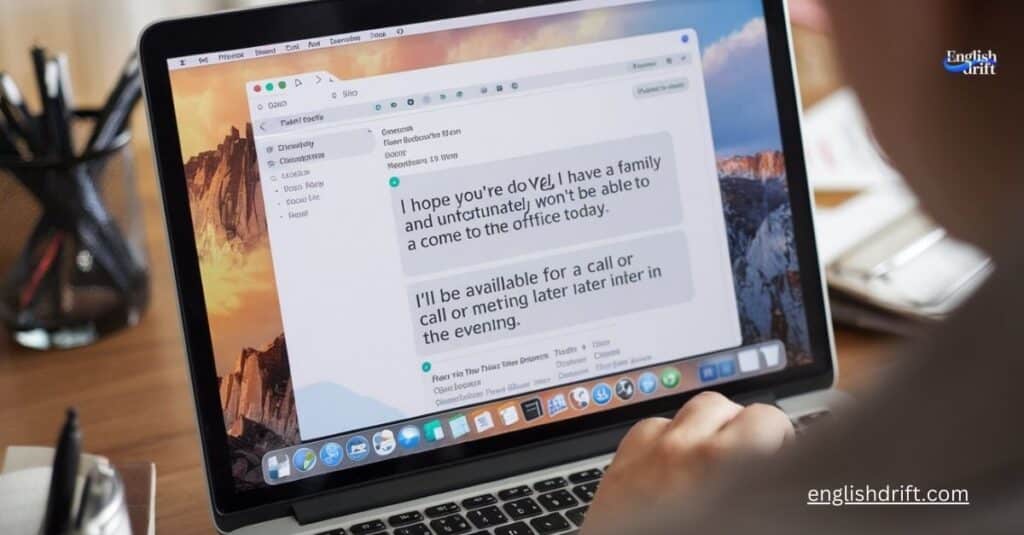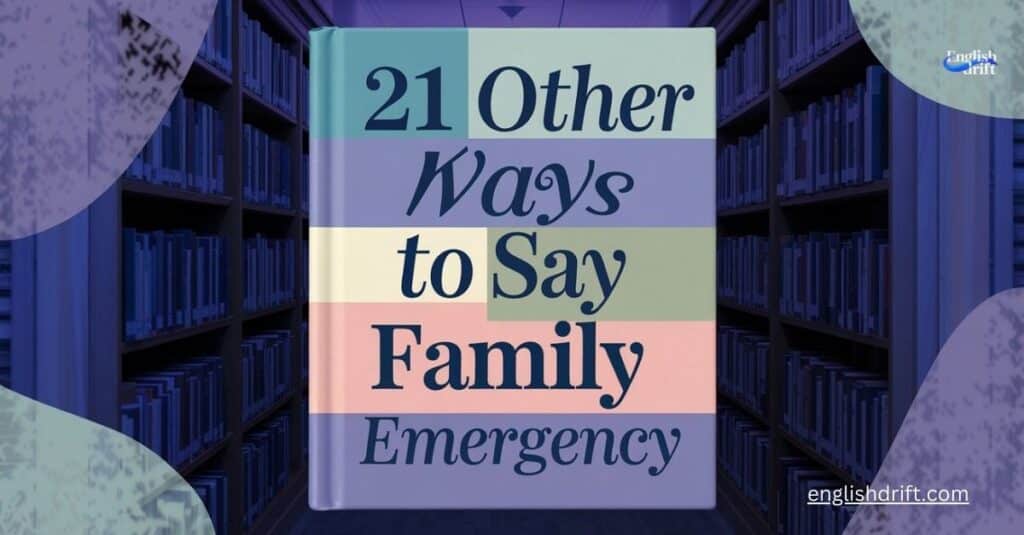In life’s unpredictable journey, we often encounter situations that demand our immediate attention away from work or other commitments. While “family emergency” is a commonly used phrase, it’s not always the most appropriate or effective way to communicate urgent personal matters. This comprehensive guide will explore 21 thoughtful alternatives to express family emergencies, helping you navigate these delicate situations with professionalism and empathy.
Understanding the Need for Alternatives
The Importance of Privacy in Personal Matters
When faced with a family crisis, maintaining a balance between transparency and privacy becomes crucial. Using alternatives to “family emergency” can help you:
- Protect sensitive information about your loved ones
- Avoid unnecessary speculation from colleagues
- Maintain professional boundaries
Balancing Transparency and Discretion in Professional Settings
In today’s interconnected world, the line between personal and professional life often blurs. Here’s why finding the right words matters:
- Trust building: Honest yet discreet communication fosters trust with employers and colleagues
- Emotional management: Appropriate phrasing helps you maintain composure in difficult times
- Cultural sensitivity: Different expressions may resonate better in diverse work environments
family emergency examples
Family emergencies can take many forms, each requiring immediate attention. Some common examples include:
- Medical Emergencies: Sudden illness, injury, or hospitalization of a close family member.
- Family Crisis: Situations like divorce, separation, or serious conflicts within the family.
- Death or Loss: The passing of a loved one or the need to attend to funeral arrangements.
- Accidents: Car crashes or other accidents involving family members that need urgent care.
- Natural Disasters: Events like fires, floods, or storms that affect your home or family’s safety.
- Mental Health Crises: Severe emotional distress or breakdowns experienced by a family member.

21 Ways to say Family Emergency in other term
- “I’m dealing with an unexpected health situation in my family.”
- “A close family member requires immediate medical attention.”
- “I need to attend to an urgent health matter at home.”
- “I’ve experienced a sudden loss in my family.”
- “I need to be with my family during a time of grief.”
- “An unexpected passing requires my presence at home.”
- “An urgent childcare situation has arisen.”
- “I’m managing an unexpected eldercare issue.”
- “A family care emergency needs my immediate attention.”
- “I’m navigating a sensitive family situation.”
- “A personal matter requires my immediate focus.”
- “I’m dealing with an emotional crisis at home.”
- “An urgent family financial matter needs my attention.”
- “I’m addressing a time-sensitive legal issue involving my family.”
- “A sudden family-related legal emergency has come up.”
- “An urgent family matter requires my immediate attention.”
- “I need to request emergency leave due to a pressing family situation.”
- “A critical family issue has arisen that necessitates my absence.”
- “An unexpected personal matter requires my immediate attention.”
- “I need to reschedule due to an urgent family situation.”
- “A time-sensitive family issue has come up unexpectedly.”
This list provides a range of alternatives suitable for various situations and levels of formality, allowing individuals to choose the most appropriate phrase for their specific circumstances.
Compassionate Phrases for Various Situations
Urgent Health Concerns
- “I’m dealing with an unexpected health situation in my family.”
- “A close family member requires immediate medical attention.”
- “I need to attend to an urgent health matter at home.”
Unexpected Loss and Bereavement
- “I’ve experienced a sudden loss in my family.”
- “I need to be with my family during a time of grief.”
- “An unexpected passing requires my presence at home.”
Childcare and Eldercare Challenges
- “An urgent childcare situation has arisen.”
- “I’m managing an unexpected eldercare issue.”
- “A family care emergency needs my immediate attention.”
Relationship and Emotional Crises
- “I’m navigating a sensitive family situation.”
- “A personal matter requires my immediate focus.”
- “I’m dealing with an emotional crisis at home.”
Financial and Legal Emergencies
- “An urgent family financial matter needs my attention.”
- “I’m addressing a time-sensitive legal issue involving my family.”
- “A sudden family-related legal emergency has come up.”
Professional and Formal Alternatives
Communicating with Employers
When explaining a family emergency to your boss, clarity and professionalism are key. Consider these phrases:
- “An urgent family matter requires my immediate attention.”
- “I need to request emergency leave due to a pressing family situation.”
- “A critical family issue has arisen that necessitates my absence.”
Pro tip: Always follow up with an email to document your communication, even if you’ve spoken in person or over the phone.
Phrases for Academic Settings
Students facing family emergencies can use these alternatives when communicating with professors or administrators:
- “Due to unforeseen family circumstances, I need to request an extension.”
- “A critical situation at home requires my immediate presence.”
- “I’m dealing with an urgent family matter that will affect my attendance.”

Diplomatic Options for Client Interactions
For those in client-facing roles, maintaining professionalism while handling personal emergencies is crucial. Try these:
- “An unexpected personal matter requires my immediate attention.”
- “I need to reschedule due to an urgent family situation.”
- “A time-sensitive family issue has come up unexpectedly.”
another term for family crisis
When discussing a family crisis, it’s often helpful to use alternative terms that convey similar urgency and sensitivity. Consider these phrases:
- Family Emergency: This term captures the immediate need for attention without revealing specifics.
- Personal Crisis: This broader term encompasses various urgent personal situations affecting family life.
- Family Distress: This phrase conveys emotional turmoil or distress within the family unit.
- Domestic Challenge: A diplomatic way to indicate difficulties faced at home that require resolution.
- Family Turmoil: This term reflects significant upheaval or conflict within family dynamics.
Using these alternatives can help maintain professionalism while addressing serious family matters.
Casual and Informal Expressions
Talking to Friends and Colleagues
With closer relationships, you might feel comfortable using more relaxed language:
- “Family stuff’s hit the fan – gotta run!”
- “Home front drama – need to deal with it ASAP.”
- “Got a family SOS – catch you later!”
Social Media-Friendly Phrases
When updating your social circle on platforms like Facebook or Twitter, consider:
- “Offline for a bit – family needs me.”
- “Taking a social media break for family reasons.”
- “Family first – be back when things settle.”
Cultural Variations in Expressing Personal Urgencies
Different cultures have unique ways of communicating family emergencies. Here’s a quick glimpse:
| Culture | Common Expression | English Translation |
|---|---|---|
| Japanese | 急な家族の用事 (Kyuuna kazoku no youji) | Sudden family business |
| Spanish | Asunto familiar urgente | Urgent family matter |
| French | Urgence familiale | Family urgency |
| German | Dringende Familienangelegenheit | Urgent family affair |
The Psychology Behind Choosing Your Words
Impact on Personal Well-being
The way you communicate a family emergency can significantly affect your stress levels and emotional state. Choosing the right words can:
- Reduce anxiety about sharing personal information
- Help you maintain a sense of control in chaotic situations
- Provide a mental buffer between work and personal life
Effects on Professional Relationships
Your choice of words can influence how colleagues and superiors perceive you. Consider these factors:
- Reliability: Clear, honest communication reinforces your professional image
- Empathy: The right phrasing can evoke understanding from others
- Boundaries: Appropriate expressions help maintain professional distance
Cultural Sensitivities to Consider
In our globalized world, being aware of cultural differences is crucial. Some cultures value:
- Directness: In countries like Germany or the Netherlands, being straightforward is appreciated
- Indirect communication: In many Asian cultures, vague references to “family matters” are often understood and respected
- Hierarchical considerations: In some cultures, the way you address a superior during a crisis can be particularly important
When to Use “Family Emergency” and When to Opt for Alternatives
Assessing the Situation and Audience
Consider these factors when deciding how to communicate your situation:
- Severity of the emergency: Life-threatening situations might warrant more direct language
- Relationship with the recipient: Closer relationships may allow for more detailed explanations
- Workplace culture: Some environments prefer more formal communication, while others are casual
Legal and HR Considerations
Be aware of your rights and obligations:
- FMLA guidelines: In the U.S., the Family and Medical Leave Act provides specific protections
- Company policies: Familiarize yourself with your organization’s protocols for personal emergencies
- Documentation: Some situations may require formal documentation for extended absences
Maintaining Boundaries While Being Honest
Striking the right balance is key:
- Be truthful but don’t overshare
- Provide enough information to justify your absence without compromising privacy
- Follow up with any required documentation promptly
Crafting Your Own Thoughtful Responses
Tailoring Your Message to the Recipient
Consider who you’re talking to:
- Direct supervisor: “I’m facing an urgent family situation that requires my immediate attention. I’ll need to step away from work unexpectedly.”
- HR department: “I’m requesting emergency leave due to a critical family matter. Please advise on the necessary procedures.”
- Colleagues: “Heads up – I’m dealing with a family issue and might be unreachable for a while.”
Balancing Brevity and Clarity
In urgent situations, concise yet clear communication is crucial:
- Be specific about your needs: “I’ll need to be away from the office for the rest of the day.”
- Indicate next steps: “I’ll update you on my return status by end of day tomorrow.”
- Offer alternatives if possible: “Jane can cover my afternoon meetings if needed.”
Following Up After the Crisis
Once the immediate emergency has passed:
- Thank those who covered for you
- Provide a brief, appropriate explanation if necessary
- Catch up on missed work promptly
Expert Insights: HR Professionals and Etiquette Specialists Weigh In
Best Practices from Top Companies
Leading organizations are setting new standards for handling personal emergencies:
- Flexible leave policies: Companies like Netflix offer unlimited personal days
- Emergency support services: EY provides counseling and financial assistance during family crises
- Clear communication channels: Google uses internal tools for quick, efficient emergency notifications
Cultural Etiquette Across Different Countries
Global etiquette expert Terri Morrison advises:
“In Japan, saying ‘kazoku no koto de’ (family matter) is often enough explanation. In contrast, U.S. workplaces might expect more details. Always consider local customs when communicating personal emergencies.”
Evolving Trends in Personal-Professional Communication
HR consultant Jennifer Brown notes a shift towards more empathetic workplace cultures:
“We’re seeing a trend towards ‘human-first’ policies. Companies are recognizing that supporting employees through personal crises ultimately benefits everyone.”
Real-Life Examples and Case Studies
Handling Family Emergencies in High-Pressure Careers
Case Study: Sarah, ER Surgeon
Sarah, a busy ER surgeon, received news of her father’s heart attack during a shift. She approached her chief resident:
“Dr. Johnson, I’ve just been informed of a critical health emergency in my immediate family. I need to hand off my current patients and leave immediately. Can we discuss coverage for my upcoming shifts?”
Outcome: Sarah’s clear, professional communication allowed for quick arrangements, ensuring both her patients’ care and her ability to be with her father.
Navigating Academic Deadlines During Personal Crises
Example: Miguel, Graduate Student
Miguel emailed his professor:
“Dear Professor Zhang,
An unexpected family situation requires my immediate attention and travel. I may not be able to submit the project due this Friday. Could we discuss options for an extension or alternative submission date?
I appreciate your understanding and will update you as soon as I have more information.
Best regards,
Miguel”
Result: The professor appreciated Miguel’s proactive communication and granted a one-week extension.
Managing Client Expectations Amid Family Troubles
Scenario: Alex, Freelance Designer
Alex messaged a client:
“Hi Lisa,
I wanted to let you know that an urgent family matter has come up unexpectedly. I may experience some delays with our project timeline. I’m doing my best to minimize any impact, but I wanted to keep you informed. I’ll send a revised schedule by tomorrow evening.
Thank you for your understanding during this challenging time.
Best,
Alex”
Outcome: The client appreciated Alex’s transparency and professional handling of the situation, strengthening their working relationship.
How to Email Your Boss About a Family Crisis: Example
When emailing your boss about a family crisis, it’s essential to be clear, concise, and professional. Here’s an example email you can use as a template:
Subject: Request for Leave Due to Family Crisis
Dear [Boss’s Name],
I hope this message finds you well. I am writing to inform you that I am facing an urgent family crisis that requires my immediate attention. Due to this unforeseen situation, I will need to take leave starting [insert date].
I apologize for any inconvenience my absence may cause and will do my best to ensure a smooth transition of my responsibilities before I leave. I appreciate your understanding during this difficult time and will keep you updated on my situation.
Thank you for your support.
Best regards,
[Your Name]
[Your Job Title]
[Your Contact Information]
This format conveys professionalism while clearly explaining the need for time off.

The Future of Personal Emergency Communication
Technology’s Role in Urgent Family Matters
Emerging tech is changing how we handle family emergencies:
- AI-powered absence management: Systems that automatically reallocate tasks during emergencies
- Secure messaging apps: Platforms designed for sensitive workplace communications
- Virtual presence solutions: Technology allowing remote participation in family events when physical presence isn’t possible
Emerging Workplace Policies on Personal Time
Progressive companies are adopting new approaches:
- No-questions-asked time off: Trusting employees to manage their time responsibly
- Mental health days: Recognizing emotional well-being as valid reason for leave
- Family care benefits: Offering support services for employees dealing with family issues
Preparing for Unexpected Crises in a Fast-Paced World
In our increasingly connected world, being prepared for family emergencies is crucial:
- Develop a personal emergency communication plan
- Familiarize yourself with your company’s policies
- Build a support network at work and home
- Keep important documents and contact information easily accessible
Key Takeaways: Mastering the Art of Tactful Communication
Quick Reference Guide for Various Situations
| Situation | Professional Phrase | Casual Alternative |
|---|---|---|
| Health Issue | “Urgent family health matter” | “Family health hiccup” |
| Bereavement | “Unexpected loss in the family” | “Family’s going through a tough time” |
| Childcare | “Sudden childcare emergency” | “Kid situation – need to dash” |
| Legal/Financial | “Time-sensitive family affair” | “Family red tape to sort out” |
Do’s and Don’ts of Discussing Personal Emergencies
Do:
- Be honest and direct
- Provide necessary information promptly
- Follow up with required documentation
Don’t:
- Overshare personal details
- Neglect to inform relevant parties
- Forget to express gratitude for understanding
Building a Supportive Network for Crisis Management
- Identify key support persons at work and home
- Discuss potential scenarios with family members
- Keep emergency contacts updated
- Cultivate relationships with colleagues who can step in if needed
FAQs
Best ways to phrase family emergency professionally
Q: What is a professional way to phrase a family emergency?
A: You might say, “I need to attend to an urgent family matter,” or “Due to unforeseen personal circumstances, I must be away.” Keeping the language neutral and respectful maintains professionalism while respecting privacy.
How to tell your boss about a family emergency
Q: How should I notify my boss about a family emergency?
A: It’s best to be direct but considerate. You can say, “I’m sorry for the short notice, but a family emergency has come up that requires my immediate attention. I’ll keep you updated on my availability.”
Different words for urgent family matter
Q: What are some alternative phrases for an urgent family matter?
A: Consider using phrases like “family crisis,” “personal emergency,” “domestic situation,” or “pressing family obligation.” These convey urgency without revealing too much detail.
How to communicate a family crisis tactfully
Q: How do I tactfully communicate a family crisis?
A: Use empathetic and respectful language. Say, “I’m dealing with a sensitive family situation that needs my immediate attention,” or “A personal crisis has arisen, and I need to be with my family.”
Alternatives to saying family emergency in an email
Q: What can I say in an email instead of ‘family emergency’?
A: In an email, you might write, “Due to urgent family circumstances, I must take leave,” or “I need to address a pressing family issue that requires my presence.”
Phrasing for urgent family health issues
Q: How do I phrase an urgent family health issue politely?
A: You could say, “A close family member has a serious health concern that needs my attention,” or “I need to be with my family due to an unexpected medical situation.”
What to say when a family tragedy happens
Q: What is a compassionate way to announce a family tragedy?
A: You might say, “I’m currently grieving a personal loss and need to take some time off,” or “A family tragedy has occurred, and I need to be with my loved ones during this difficult time.”
How to explain a family emergency politely
Q: How can I explain a family emergency politely?
A: Try saying, “I regret to inform you that I must step away due to a pressing family matter,” or “I need to attend to an urgent situation involving a close family member.”
Most empathetic ways to express family emergency
Q: What are the most empathetic ways to express a family emergency?
A: Use phrases like “My family needs my immediate support right now,” or “I must be with my loved ones during a challenging time.”
Phrases to use when a loved one is sick
Q: What can I say when a loved one is sick?
A: You could say, “I’m taking time off to care for a family member who is unwell,” or “A close relative is dealing with a health issue that requires my presence.”
How to notify your employer about a personal crisis
Q: What is the best way to tell my employer about a personal crisis?
A: Keep it brief and to the point. Say, “I’m facing a personal crisis that requires my immediate attention. I will update you as soon as possible.”
How to word an absence due to a family issue
Q: How do I professionally word my absence due to a family issue?
A: Try saying, “Due to an urgent family matter, I will need to take leave starting today,” or “I’m unable to attend due to a serious family obligation.”
Best excuses for missing work due to family matters
Q: What are the best excuses to use for missing work due to family matters?
A: Some valid excuses include “urgent family crisis,” “unforeseen family obligation,” or “pressing domestic issue.” It’s important to be honest and respectful in your communication.
How to request leave for family emergency situations
Q: How should I request leave for a family emergency?
A: You might say, “I am requesting emergency leave to deal with a pressing family situation,” or “I need to take time off immediately due to a family health crisis.”
What to say when you have a private family matter
Q: How do I communicate that I have a private family matter?
A: Use phrases like “I need to attend to a private family concern,” or “A confidential family issue requires my immediate attention.” This approach respects both your privacy and the situation’s sensitivity.
These FAQs aim to provide practical and professional phrasing options for each situation, enhancing both communication and empathy in sensitive moments.
What to Say Instead of “Family Emergency”?
Instead of saying “family emergency,” try using more specific yet still tactful phrases like:
- “Urgent family matter”
- “Personal family situation”
- “Unforeseen family crisis”
- “Family health concern”
- “Pressing domestic issue”
- “Private family matter”
- “Family obligation requires my attention”
These alternatives maintain professionalism and discretion without divulging too much detail. They help convey the urgency of your situation while respecting your privacy. Choose words that best fit the context and sensitivity of your situation, ensuring your message remains considerate and clear.
conclusion
Navigating family emergencies requires a delicate balance of honesty, professionalism, and empathy. By mastering these 21 alternatives to “family emergency” and understanding the nuances of crisis communication, you’ll be better equipped to handle life’s unexpected challenges while maintaining your professional standing. Remember, it’s not just about finding the right words – it’s about fostering a culture of understanding and support in both your personal and professional life.
READ MORE
- 20 other Ways to Say “Happy Thursday” (with Examples)
- How To Respond To WYLL? 23+ Genius Replies
- 19 other Ways to Say “Please Let Me Know if This Works for You”
- Comebacks When Someone Ignores You: 27+ Responses
- 19 other Ways to Say “Happy Sabbath” with examples

Henry James is an experienced blogger at English Drift, specializing in English grammar and vocabulary. With a passion for language and clear communication, Henry helps readers enhance their writing skills through insightful guides and practical tips.







